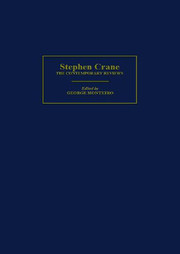Book contents
- Frontmatter
- Contents
- Series editor's preface
- Introduction
- Acknowledgments
- Maggie: A Girl of the Streets (1893)
- The Black Riders and Other Lines (1895)
- The Red Badge of Courage (1895)
- George's Mother (1896)
- Maggie: A Girl of the Streets (1896)
- The Little Regiment and Other Episodes of the American Civil War (1896)
- The Third Violet (1897)
- The Open Boat and Other Tales of Adventure (1898)
- Pictures of War (1898)
- War is Kind (1899)
- Active Service: A Novel (1899)
- The Monster and Other Stories (1899)
- Bowery Tales (1900)
- Whilomville Stories (1900)
- Wounds in the Rain: War Stories (1900)
- The Monster and Other Stories (1901)
- Great Battles of the World (1901)
- Last Words (1902)
- The O'Ruddy (1903)
- Index
- References
Pictures of War (1898)
Published online by Cambridge University Press: 06 July 2010
- Frontmatter
- Contents
- Series editor's preface
- Introduction
- Acknowledgments
- Maggie: A Girl of the Streets (1893)
- The Black Riders and Other Lines (1895)
- The Red Badge of Courage (1895)
- George's Mother (1896)
- Maggie: A Girl of the Streets (1896)
- The Little Regiment and Other Episodes of the American Civil War (1896)
- The Third Violet (1897)
- The Open Boat and Other Tales of Adventure (1898)
- Pictures of War (1898)
- War is Kind (1899)
- Active Service: A Novel (1899)
- The Monster and Other Stories (1899)
- Bowery Tales (1900)
- Whilomville Stories (1900)
- Wounds in the Rain: War Stories (1900)
- The Monster and Other Stories (1901)
- Great Battles of the World (1901)
- Last Words (1902)
- The O'Ruddy (1903)
- Index
- References
Summary
Literature 3 (August 27, 1898), p. 178
Under this heading we may perhaps take note of a book of a different kind. Mr. Stephen Crane's Pictures of War, a collection of seven of his military sketches, beginning with his well-known “Red Badge of Courage,” appeals perhaps to the literary artist more than to the soldier, and the interest of the former in the reprint will be much heightened by the “Appreciation” contributed by Mr. George Wyndham. Mr. Wyndham has much to say that is true, discriminating, and suggestive, though his efforts to say something original in an original way strike one as rather exhausting in this hot weather. He finds but one descriptive deficiency in Mr. Crane:—
An undue subordination of the shrill cry of bullets to the sharp crashing of rifles. He omits the long chromatic whine defining its visible arc in the air and the fretful snatch a few feet from the listener's head.
This is mentioned as a fault in Mr. Crane's “observation”—perhaps hardly a correct word to use in the case of a writer who, when he drew his first and most famous “picture of war,” is believed to have actually heard neither the whine nor the snatch. There Mr. Crane is at a disadvantage in comparison with Tolstoi, who, so Mr. Wyndham thinks, gives a less true picture of war than the young American with his imaginary battlefield. It might be argued plausibly that to describe fighting it is not necessary to have fought.
- Type
- Chapter
- Information
- Stephen CraneThe Contemporary Reviews, pp. 187 - 192Publisher: Cambridge University PressPrint publication year: 2009



